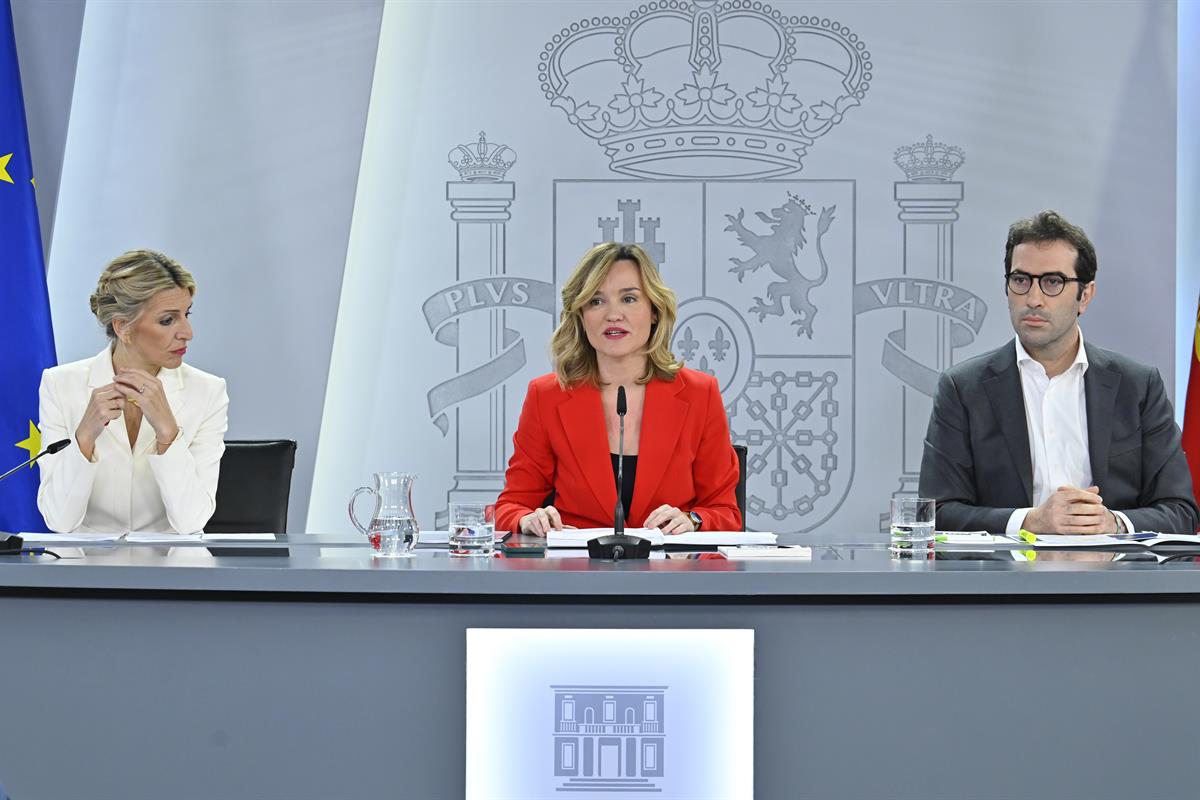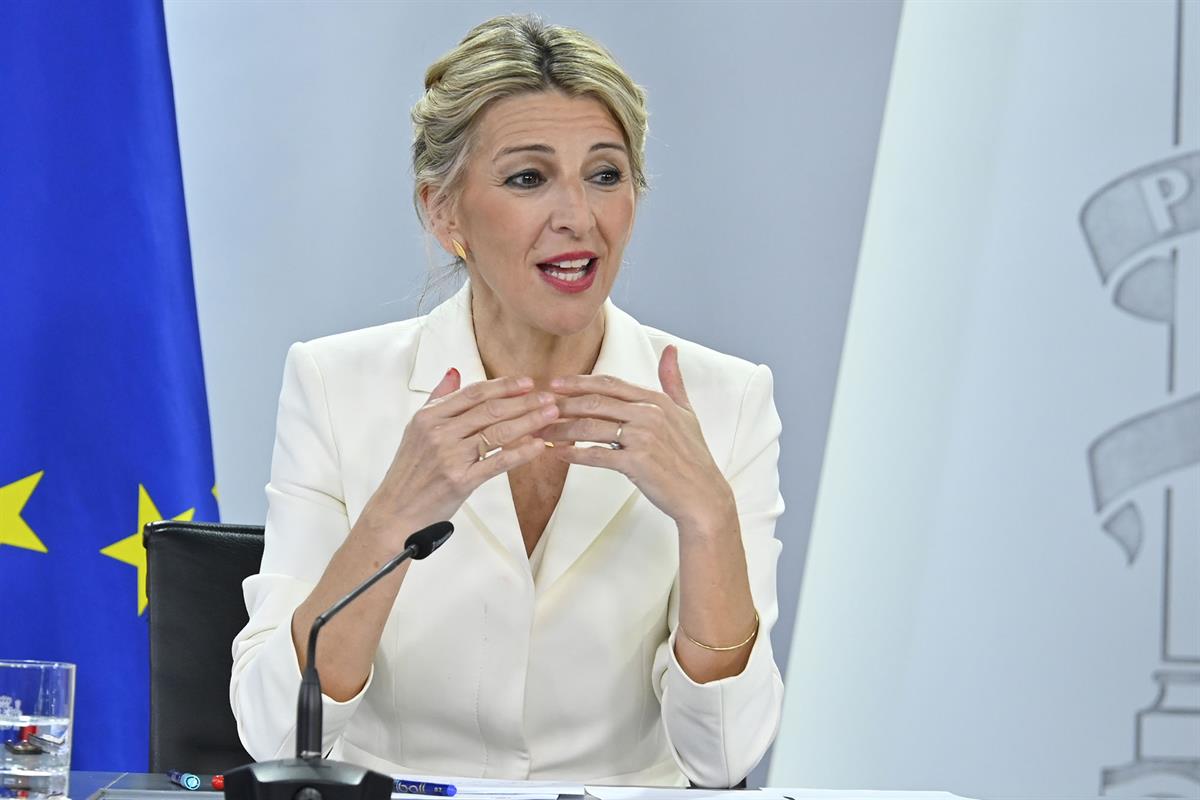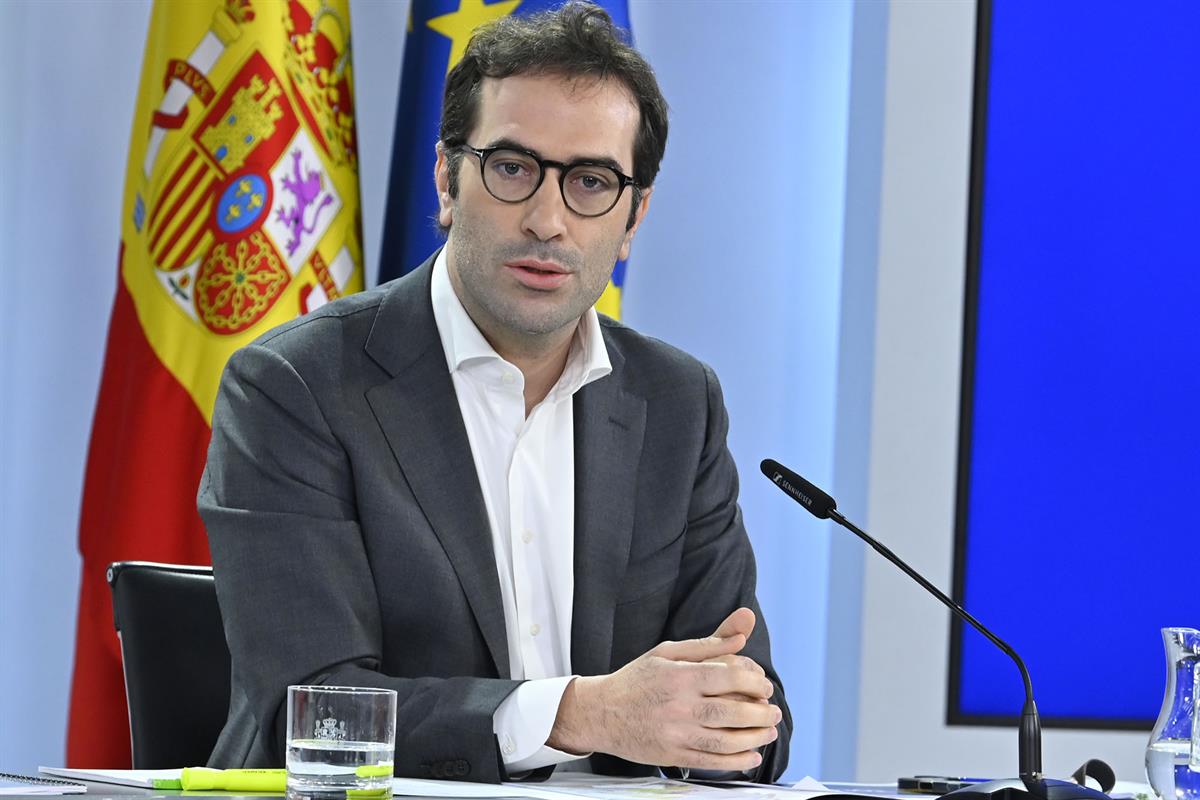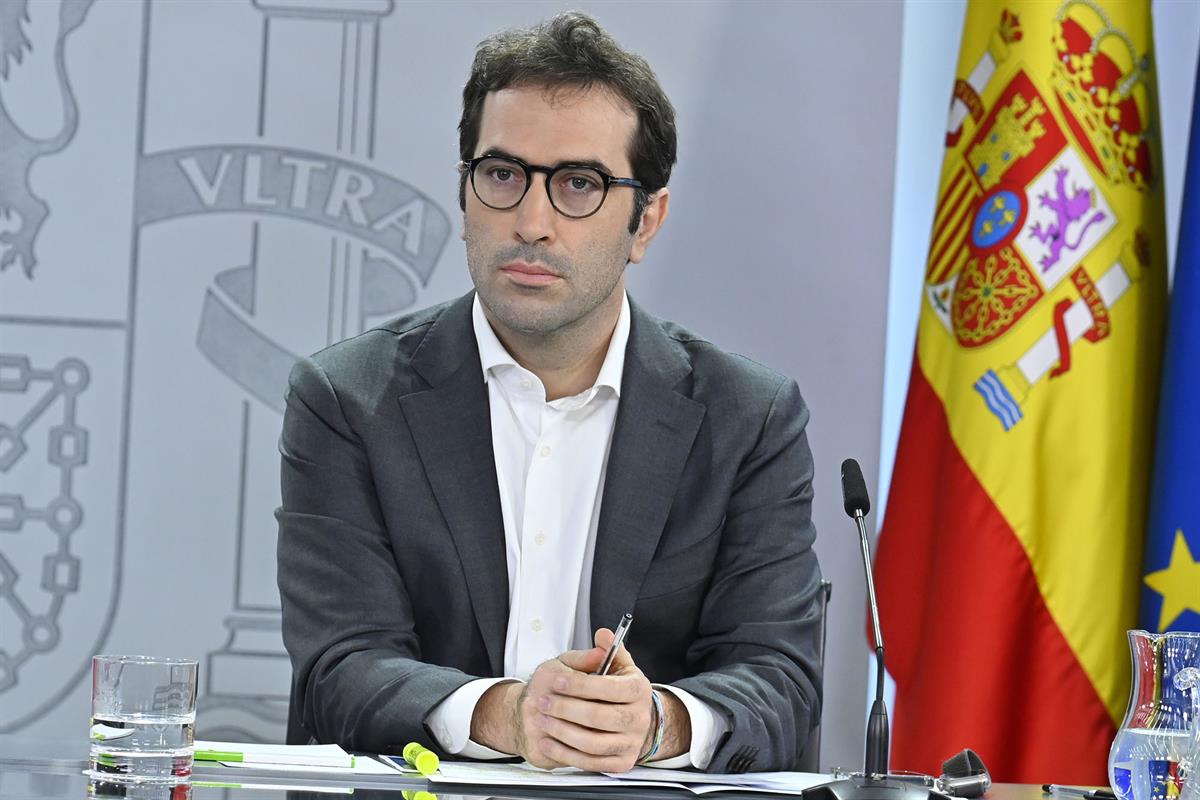Council of Ministers
The Government of Spain presents the reduction of ordinary working hours to 37.5 a week
Council of Ministers - 2025.2.4
Moncloa Palace, Madrid
 Ministers Yolanda Díaz, Pilar Alegría and Carlos Cuerpo, at the press conference after the Council of Ministers (Pool Moncloa/José Manuel Álvarez)
Ministers Yolanda Díaz, Pilar Alegría and Carlos Cuerpo, at the press conference after the Council of Ministers (Pool Moncloa/José Manuel Álvarez)
The Council of Ministers has presented the draft law on the reduction of the maximum length of the ordinary working day, the recording of working hours and the right to disconnect from work. It will allow the maximum working hours to be reduced to 37.5 hours per week on average over the year, with no reduction in pay.
The measure was addressed within the framework of social dialogue and follows on from the agreement reached with the CCOO and UGT trade unions, which was signed on 20 December 2024. The text will be sent to Parliament for parliamentary processing after final approval at a forthcoming Council of Ministers.
The Second Vice-President of the Government and Minister for Work and Social Economy, Yolanda Díaz, stressed that the reduction from the current 40 hours to 37.5 "is not just another economic or labour variable", but a project for the country, which will serve to modernise Spain.
Díaz argued that, as the 1944 Declaration of Philadelphia states, labour is not a commodity. The minister conveyed that work is not an end in itself: "We don't live to work, we work to live, work is a means". She also argued that "what is important is our lives and not the time we spend on a professional activity", and to this effect, the proposal to reduce the working day "is to do with living better, working less and being more productive and economically efficient".
In her view, this is a measure that workers are waiting for and that improves productivity. In this respect, she pointed out that since the last reduction in working hours agreed in 1983, productivity has increased by 53%. "It is not about putting in the hours at work; it is about being efficient, and it's a proven fact that after a certain amount of time at work, productivity not only doesn't increase, but decreases. This is therefore the element we are going to rectify with the reduction of just half an hour a day in the working day", she remarked.
Yolanda Díaz added that the future law reduces absenteeism, democratises benefits, increases equality and balances productive and reproductive work.
Recording working time and the right to disconnect from work
 The Second Vice-President of the Government and Minister for Work and Social Economy, Yolanda Díaz, during her speech at the press conference after the Council of Ministers | Pool Moncloa/José Manuel Álvarez
The Second Vice-President of the Government and Minister for Work and Social Economy, Yolanda Díaz, during her speech at the press conference after the Council of Ministers | Pool Moncloa/José Manuel Álvarez
The regulation reformulates time control, in the vice-president's words, in "a country that does a barbaric amount of unpaid overtime per week: three million hours". Time recording will be digital and will be carried out by remote control. Díaz pointed out that hundreds of public employees of the Labour Inspectorate are working to prevent irregularities.
The vice-president also stressed that the measure establishes the right to disconnect from work: "Permanent connection to work causes damage to mental health and relentless stress". No employee will be required to respond to an email or a call outside working hours, and neither will they be penalised or suffer reprisals for not doing so.
Gender perspective
Yolanda Díaz stressed that "the gender impact of this regulation is incredible", affecting 12 million people, and especially favouring women.
She concluded her speech by pointing out that the regulation is "the outcome of social dialogue", which is buoyant Spain, calling on the leaders of employers' organisations not to oppose a measure of this scope: "What we need to do now is turn what is already on the streets into common sense and take it to the Lower House of Parliament".
Improved economic forecasts
 The Minister for Economy, Trade and Business, Carlos Cuerpo, during his speech at the press conference after the Council of Ministers | Pool Moncloa/José Manuel Álvarez
The Minister for Economy, Trade and Business, Carlos Cuerpo, during his speech at the press conference after the Council of Ministers | Pool Moncloa/José Manuel Álvarez
The Minister for Economy, Trade and Business has presented to the Council of Ministers the update of the macroeconomic framework. Cuerpo said that the new forecasts confirm a pattern of "robust growth", and at the same time, advance the commitment to strengthen the welfare state and social achievements.
The minister described the current economic model as "sustainable and virtuous", combining factors that did not coincide in previous stages. He explained that the outlook shows that growth and job creation are compatible with productivity growth, progressive price moderation, maintaining external financing capacity, environmental sustainability and fiscal responsibility. He added that it is, therefore, a structural change that modernises the Spanish economy.
Positive developments in consumption and investment
The Executive's new forecast is for GDP to grow by 2.6% this year and 2.2% in 2026. Carlos Cuerpo detailed that the improved forecasts are due to the good economic data that have recently been made known, such as the national insurance contributor figures and the increase of the GDP registered in the last quarter of 2024. The Spanish economy closed that year with growth of 3.2%, double what analysts expected at the beginning of 2024.
The Minister for Economy stressed that Spain is exceeding the medium-term potential growth target of 2%, and that it is leading the expansion among the major European economies. In the case of the euro area, Spain is growing 4.5 times more than the average, contributing half of the growth of all countries in 2024.
Moreover, according to Carlos Cuerpo, the growth pattern is balanced. On the demand side, the forecasts point to a positive contribution from private consumption - based on a "sound financial situation of households" - and investment, driven by the good outlook of entrepreneurs, improved financial conditions and the continued roll-out of the Recovery, Transformation and Resilience Plan. The minister recalled that a recent survey by the Bank of Spain showed that if this funding had not been available, 45% of the plan's beneficiaries would not have undertaken the investment for which they had earmarked the funds, or they would have invested a smaller amount. "The funds are managing to leverage more private investment," he said.
Also on the demand side, the Government expects exports to maintain their share in goods and to grow steadily in both tourism and non-tourism services.
Twenty-three million employed by the end of 2026
 The Minister for Economy, Trade and Business, Carlos Cuerpo, during the press conference after the Council of Ministers | Pool Moncloa/José Manuel Álvarez
The Minister for Economy, Trade and Business, Carlos Cuerpo, during the press conference after the Council of Ministers | Pool Moncloa/José Manuel Álvarez
The Minister for Economy, Trade and Business has also highlighted the balance on the supply side, as both employment and hourly productivity of workers will increase. The dynamism of the labour market will lead to a gain of around half a million employed people per year in 2025 and 2026, bringing the total number to 23 million by the end of the biennium.
This evolution will translate into a decrease in the unemployment rate, according to Carlos Cuerpo, who pointed out that the current figures are the lowest since 2008. Structural change is also taking place in this field, as manifested in reduced temporary employment and the creation of jobs in high value-added sectors, in scientific activities and associated with exports of non-tourist services.
Improving the situation of households
"We are aware that improvements at the macro level have to be translated into the day-to-day life of citizens," said Carlos Cuerpo. The minister defended that the measures put in place due to the war in Ukraine and the positive evolution of the labour market "are allowing households to progressively recover purchasing power". He added that the situation of households will continue to improve thanks to wage growth and the reduction in prices and interest rates.
Mr. Cuerpo was insistent in his message of confidence in the future of the Spanish economy, with a "virtuous circle of growth" and "robust job creation" based on more productive and competitive companies and a "continuous conquest of rights" for workers.
Historic national insurance contributor and employment figures
The Minister for Education, Vocational Training and Sports and Government Spokesperson, Pilar Alegría, during her speech at the press conference after the Council of Ministers | Pool Moncloa/José Manuel Álvarez
Likewise on the economic front, during her speech the Minister for Education, Vocational Training and Sports and Government Spokesperson, Pilar Alegría, referred to the latest data on national security contribution and employment, which she described as "historic". "We have just over 21,300,000 people contributing to Social Security, and unemployment is at its lowest level in a January for 17 years," Alegría explained, stressing that in 2024 the unemployment rate fell by 168,000 people.
The spokesperson, who reviewed the economic context the Government has faced since the pandemic, stressed that the Government has been applying a "successful" model that "leaves no one behind", with measures such as ERTE, labour reform and reduced working hours. "This is the direction the Government has taken from the outset: to continue working to achieve growth that goes hand in hand with the consolidation of workers' rights", she summarised.
New National Maritime Rescue Plan
Pilar Alegría also informed of the approval by the Council of Ministers of a new National Maritime Rescue Plan, with an investment of €163 million planned for the next three years.
The minister explained that this investment will enable the modernisation and strengthening of the maritime accident response system by implementing new technologies, and with the construction of two tugboats, new patrol boats, the incorporation of drones and a coordination centre in Palma de Mallorca. At this point, Alegría acknowledged the work of the personnel whose work is rescue.
In addition to improving the accident response system, the objectives of the plan include strengthening the fight against climate change and promoting the safety and security of seas and oceans, goals that will be furthered by preventing air pollution from ships, promoting sustainability in maritime transport and coordinating with all national and international actors involved in these issues.
World Cancer Day
The government spokesperson ended her speech with a message of support for cancer patients in the framework of the celebration of World Day against this disease, for which, she stressed, investment in public health is essential.
"We want to take advantage of this day to continue to demand and highlight the importance of investment not only in public health, but also in research, science and innovation", said Alegría, who referred to the visit by the President of the Government to the Novartis plant in Zaragoza, which specialises in radiopharmaceuticals.
"Science is our ally in the eradication of this disease and, of course, we will continue to invest in it out of responsibility and commitment," she concluded.
Non official translation





